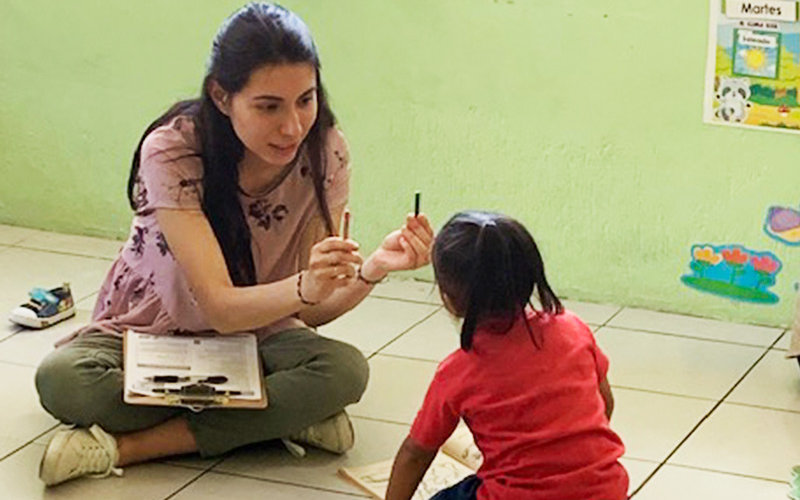
When 20 students majoring in child and adolescent development flew to Costa Rica this past spring break, they knew they would be experiencing a Central American country far different than Orange County.
They also knew that the one-week study abroad experience would give them an opportunity to put their classroom education to practical use in a global setting: working with babies and toddlers born to teen mothers.
“The trip was very life-changing,” said Nancy Yanez, whose goal is to go into occupational therapy. “It was such a great experience; it made the whole college experience that much more special.”
Diana Robles, lecturer in child and adolescent studies and the fieldwork adviser for the program, has led the service-learning practicum to Costa Rica for several years.
For the last two years, thanks to Robles’ work with the Centers for Disease Control and Prevention, child and adolescent development majors have been using the agency’s development milestones tracker to conduct evaluations of the infants and toddlers at a Costa Rica adolescent and pregnancy group home.
“These students saw child development in the flesh,” explained Robles. “What you see in a class or on a film is vastly different than working with actual children, especially those from a different culture, a different socio-economic background from yourself.
“This was a very diverse cultural experience and much different from what they would experience in this country,” she noted. “Costa Rica is still a developing country where poverty is much worse than what we have here. It means the infants and toddlers develop much differently — cognitively, in language development, movement and in social interaction — from what we see in this country.
“Learning about being a professional in such a setting was one of our students’ favorite parts of the experience.”
Student Sydney McLamb agreed. While she had visited Costa Rica before with her family, “this was completely different. Doing this type of service learning, you just grow so much.
“The experience took me out of my comfort zone,” McLamb admitted, adding “it was one of the most humbling things that I’ve done … just to see how these people live and survive. … living in California, we’re so very fortunate.”
Melanie Ascencio counts as valuable the opportunity to compare how American children and children from a foreign country are taught, “creating diversity in how I view the world.
“One of the most memorable events was entering the classroom and interacting with the teenage parents,” said Ascencio. “I saw how important it was for them to know what we were doing with their children. I was able to have a conversation with a mother-to-be and hear her concern about the children. It showed how important it is for teen mothers to understand the development of their children.”
Both Yanez and McLamb were stunned by the self-sufficiency they saw when working with the infants and toddlers. “I saw an 18-month-old little boy who climbed onto a rocking horse and was rocking very hard,” Yanez said.
“We tend to coddle our toddlers at that age,” noted Yanez. “Physically, they (the Costa Rican children) seem much more advanced. They have a lot more freedom … they’re not supervised as much as toddlers are here.”
“We were able to do activities with the youngsters to see how they would interact with us and each other,” said McLamb, who hopes to one day be a counselor working with adolescents with mental illness. “I felt we were having a big impact on their lives. I will never forget what I learned and being able to experience it.”